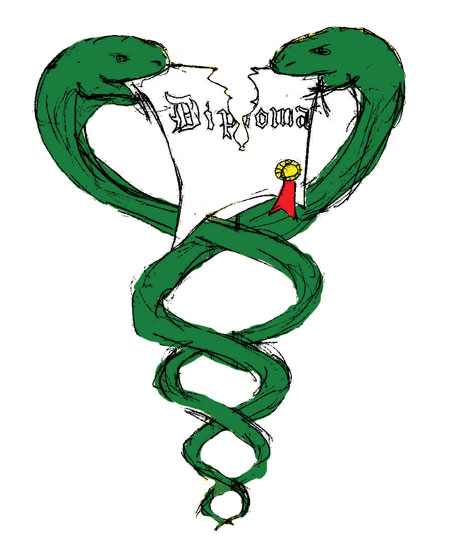Vague cheating rules never prosper

By Avni Nijhawan
Oct. 19, 2009 9:00 p.m.
CORRECTION: A previous version of this article did not acknowledge Section 102.01f of the Student Conduct Code, which prohibits students from “threatening personal or professional repercussions against an instructor to coerce the instructor to change a grade or otherwise evaluate the student’s work by criteria not directly reflective of coursework.” The complete UCLA Student Conduct Code can be found on the Web site of the UCLA Registrar’s Office.
As the competition for jobs and grad schools increases, so does the pressure to cheat.
UCLA Student Affairs receives several hundred cases of cheating per year, which, according to Senior Associate Dean Cary Porter, embody a whole host of cheating mechanisms from plagiarism to looking at other students’ exams and even to arranging to have someone else take exams.
While cheating isn’t a new phenomenon, the outright brazenness that some students display is striking.
Currently, UCLA leaves examination procedures entirely up to instructors. This has led to huge discrepancies in test-taking procedures.
For example, one of my friend’s professors made students keep their backpacks at the front, remove hooded jackets and drink only from label-free water bottles during exams. On the other hand, I once had a professor who let us use our cell phones during a midterm to keep track of time.
Strict and specific regulations need to be implemented to remove any doubts that students, TAs and professors may have about what is acceptable behavior.
Combating cheating would require collaboration, and a few simple measures could reduce instances of cheating ““ or at least make students think twice before engaging in deceptive behavior.
Although they may feel uncomfortable or rigid, universally implemented policies may be the best way to prevent cheating and give students equal opportunities to succeed.
Being too cautious is certainly better than being too lax ““ having cell phones out during an exam is an invitation for trouble and a distraction for students. No test-takers want to hear their neighbors’ phones vibrate violently next to them.
Standards that span departments would remove ambiguity and confusion from the minds of teachers and students alike.
These should include an all-encompassing ban on talking, cell-phone use and unchaperoned trips to the bathroom. A mandatory minimum proctor-to-student ratio should also be required, as well as instructions on how proctoring should be done. Proctors often vary in their monitoring, from peeking over students’ shoulders to remaining absolutely stationary at the front of the classroom.
In addition to universal rules for test-taking, university policies need to be more specific about what kind of student behavior is unacceptable. At times, it’s hard to tell when cheating is cheating.
For professor of psychology and psychiatry David Jentsch, the most problematic form of dishonest behavior comes when students desperately beg for grade changes after the final exam.
“It’s clearly not cheating, … (but) if you were to exert emotional coercion and get a grade change, how is that really different practically … than if they’d just cheated?”
Emotional harassment is obviously unethical, and Section 102.01f of the Student Conduct Code prohibits “threatening personal or professional repercussions against an instructor to coerce the instructor to change a grade or otherwise evaluate the student’s work by criteria not directly reflective of coursework.”
As emblems of intellect and sources of wisdom, professors have a powerful influence on students, so it makes sense for them to spend a significant portion of the first day of classes firmly espousing academic integrity.
Most professors quickly summarize the plagiarism section of the syllabus in only three words: “Do not plagiarize.”
Instead, they should use that part of the syllabus to clearly educate students about plagiarism, remind students why they are at UCLA (in order to genuinely learn), and to reiterate the consequences of cheating ““ including the negative repercussions that affect the entire UCLA community.
Of course, professors and administrators aren’t the only ones responsible for reducing temptation ““ students must change their habits and attitudes as well.
Students will find themselves much less likely to cheat on a paper or an exam if they refrain from procrastinating.
They must also be firm supporters of honesty both by working scrupulously and by vigilantly reporting academic dishonesty they witness.
Students must realize that it’s more important to learn from a class than it is to blindly (and dishonestly) get an A in it.
Sometimes, college students seem so desperate for “success” that they forget basic ethical behavior.
But there is simply no excuse for deceitful academic conduct, even with today’s bleak economy, increasing class sizes and lousy library hours.
These factors may present new challenges, but with the help of a UCLA community fortified with high standards of integrity and conscious of the pressures all of us face, there is still hope for a fairer, more honest classroom.
Feel like you need to cheat? E-mail Nijhawan at [email protected]. Send general comments to [email protected].


